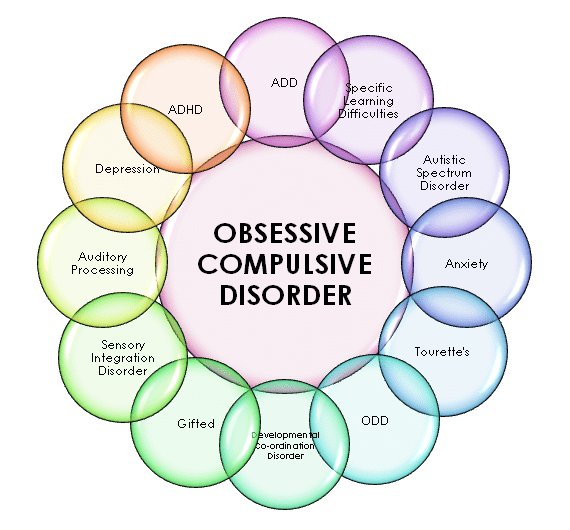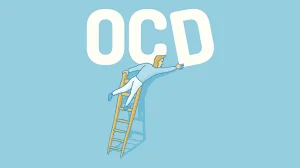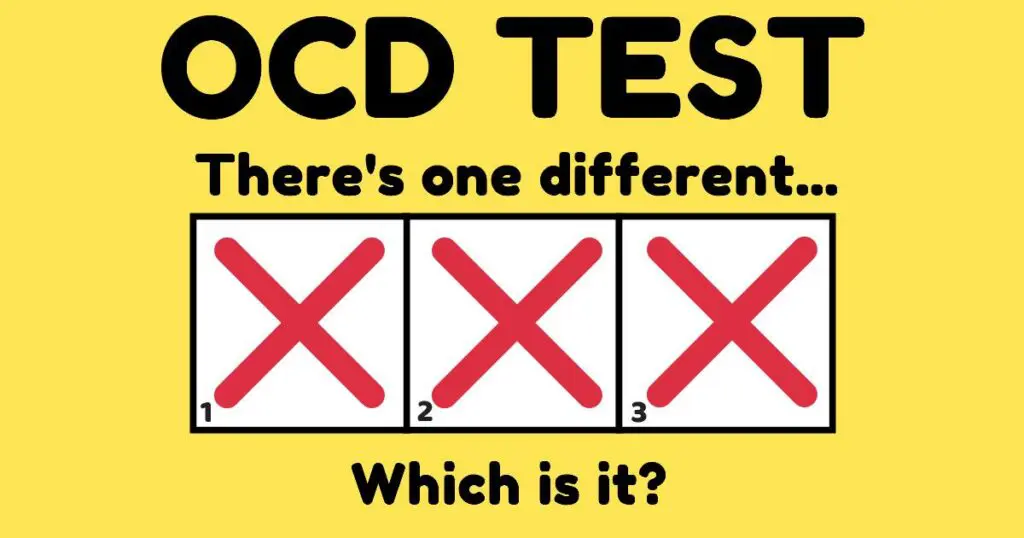We all have our own quirks and habits, some more noticeable than others. But what if you happened to be a little bit obsessive-compulsive? That would make your day-to-day life a lot more difficult. If you suspect that you might be OCD (or know someone who is), then take this test! Moreover, the goal of this article is to help people identify the symptoms and better understand OCD. It also explores how it can impact their lives and relationships with other people, as well as explore options for treatment.
What is OCD?

Obsessive-compulsive disorder, or OCD for short, is a mental illness that affects people in different ways. Symptoms can include anxiety, depression, and intrusive thoughts. These symptoms often result in obsessive behavior.
How does OCD impact someone?
Some of the ways that it might affect people are:
- Anxiety about making mistakes or doing something wrong
- Inability to relax without feeling guilty or anxious
- Trouble concentrating because they worry about their obsessions coming true
What are some common OCD Symptoms?
Some examples include:
- Excessive hand washing or bathing
- Unable to throw out useless items, even if they’re dirty or broken
- Constantly needing everything in a specific place – e.g., having all your pens lined up neatly on your desk at work because it comforts you and makes you feel less anxious about doing something wrong
- Needing things arranged just so (e.g., being unable to eat food unless it’s cut into different shapes)
- Also, being extremely upset by messes, thinking that they have hidden meanings like death or bad luck
What is an OCD Test?

An OCD test consists of a series of questions that aim to find out if the person has obsessive-compulsive disorder. This test is used to understand the severity of their symptoms.
Sample OCD Test Questions
Do you ever have thoughts that keep coming back and make you feel bad?
- Never
- Rarely
- Sometimes
- Often
- Very Often
Do you ever worry about getting germs? Do you wash your hands a lot? How often do you wash your hands?
- Never
- Rarely
- Sometimes
- Often
- Very Often
Do you constantly check on things, or rearrange items?
- Never
- Rarely
- Sometimes
- Often
- Very Often
Do you experience intrusive thoughts that are aggressive (i.e. harm to yourself or others) or about taboo topics such as porn?
- Never
- Rarely
- Sometimes
- Often
- Very Often
Do you try to forget about these thoughts or images? If so, how often do you do this?
- Never
- Rarely
- Sometimes
- Often
- Very Often
Do you do things that make you feel better when you are anxious, such as counting, checking, or cleaning?
- Never
- Rarely
- Sometimes
- Often
- Very Often
Do you think a lot about bad things that might happen? Do you do things every day to avoid these thoughts or feelings? If so, how often do you think about it?
- Never
- Rarely
- Sometimes
- Often
- Very Often
Do your job, home life, and social relationships get worse because of obsessive thoughts or behaviors?
- Never
- Rarely
- Sometimes
- Often
- Very Often
Who Is This OCD Test For?

This OCD test was made for writers and readers who want to get a better understanding of how their characters think. It’s also good for people interested in psychology or mental disorders, as well as those with personal knowledge on the topic. After reading this post you’ll have an idea of what it means to have obsessive-compulsive disorder (OCD), which is hopefully helpful if you’re treating someone that has these thoughts running through their mind all day long. So without further ado let’s begin! This quiz focuses primarily on checking compulsions because they are most commonly associated with OCD, but there are other symptoms so keep an eye out for them too!
How Accurate Is It?
The OCD test has been made so that it’s as accurate as possible. We have a lot of experience with psychology and mental health, plus we’ve used our knowledge to make the quiz as similar to real-life situations as possible. This way you can see how your characters would realistically react in certain circumstances or scenarios!
There are 8 questions on this particular quiz which should take between five and ten minutes depending on how fast you read/think. There is no time limit for each question–feel free to go over them at your own pace! When finished click “Get Results” for a brief analysis about what behaviors indicate someone may be dealing with obsessive-compulsive disorder (OCD). If there is enough interest I’ll create other quizzes about different types of OCD.
Why do I need an OCD test?
This test may be done if you or your child has obsessive thoughts and/or is showing compulsive behaviors.
Common obsessions include:
- Some people are scared of dirt or germs. They might not want to come to your house.
- People can feel scared when they worry that something bad will happen to them or their families.
- Being neat and organized is important. This means that you should clean up after yourself and keep things organized.
- You can worry about many things. You might worry that you left the stove on or the door unlocked.
Common compulsions include:
- People who have OCD wash their hands more than 100 times a day.
- Check and turn off the lights and appliances.
- Doing the same motion again and again, like sitting down and then getting up from a chair.
- You need to constantly clean the house.
- Check buttons and zippers.
What happens during an OCD test?

An OCD test is a questionnaire that asks the respondent to rate how much they agree with statements about themselves. The items in an OCI test are related to common obsessions and compulsions, such as thoughts of contamination or handwashing.
The results can help you determine whether a person has Obsessive-Compulsive Disorder (OCD). In some cases, it may also be used to monitor progress during treatment for OCD. It’s important not to self-diagnose based on this single tool because only a mental health professional can diagnose an individual with OCD.
The results of the test are based on how much respondents agree or disagree with statements about themselves and their experiences. There is not one standard scoring method for this questionnaire, so it’s important to ask your doctor what you should do in order to interpret the results correctly.
How To Analyze Your OCD Test Results
The results are not a clinical diagnosis or professional opinion, but simply the writer’s interpretation of how their character would react to certain situations and whether these reactions resemble those found in people with OCD (disorder). Seeing as this quiz is based on real-life examples it should be pretty accurate if you’ve done your research! It can’t tell you for sure though because everyone reacts differently and some symptoms aren’t always present – that’s why we recommend talking with someone who knows more about mental disorders than us. They’ll also help determine what type(s) of therapy might work best for your characters depending on their specific problems/symptoms. If they don’t have any then maybe you’re dealing with a healthy mind after all!
Although it’s not necessary if you want to learn more about OCD feel free to check out the links I’ve provided at the bottom of this post. There are some great resources that can be incredibly helpful when writing stories or novels, plus they’ll give your characters plenty of therapy options too.
Treatment of OCD
People with obsessive-compulsive disorder (OCD) can benefit from Cognitive Behavioral Therapy, which has been shown to be one of the most effective therapies for this type of anxiety. This method is used when a person’s obsessions and compulsions are causing significant distress or problems in their daily life — that includes if they have trouble being productive at work/school because all they do is think about certain things! One way treatment may help someone overcome these thoughts involves exposure therapy, where people learn how to gradually face what scares them without having a panic attack every time it happens. It might sound scary but it works really well–plus there are ways to soothe your character before facing each situation too.
Another type of Cognitive Behavioral Therapy treatment is called Response Prevention. This form of therapy focuses on stopping compulsions while still allowing the person to confront what they are afraid of, but in a safe way! You can do this by exposing them to whatever triggers their obsessive/compulsive thoughts without giving in to any urges your character might have (for example washing hands one time instead of multiple times like usual).
Someone who has OCD may find it helpful to use self-help books or apps, as well as seeing a therapist regularly depending on how severe your character’s problems are. The more support systems there are for someone with obsessions and compulsions, the better chance they’ll feel better ASAP!
Conclusion
If you have been experiencing symptoms of OCD, it is important to get a professional diagnosis from someone who specializes in this condition. Once you know what type of OCD you are facing, your treatment options will be more clear and tailored to the specific needs that stem from your particular form of mental illness. The best way for anyone with obsessive-compulsive disorder to find relief is by seeking help right away – before their compulsions become worse or they develop secondary conditions as a result of having untreated anxiety or depression.
If you are looking for affordable Online OCD Counseling MantraCare can help: Book a trial therapy session


